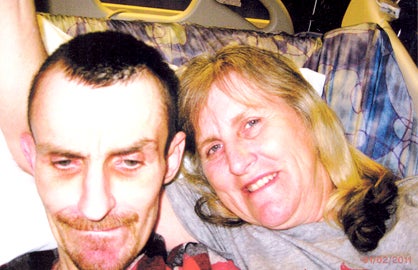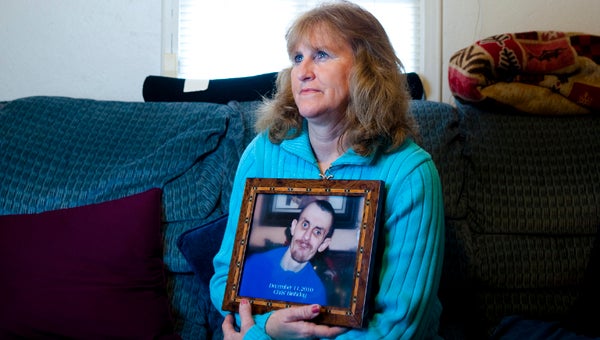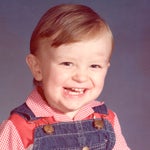Mother continues fight for cure
Published 9:30 am Sunday, February 26, 2012
Chris Gaines was a normal little boy when he was born. His mother, Becky, described him as “perfectly healthy,” “smart” and “independent.” Up until the age of 3, he was fine — until one morning, she heard him making noises with his mouth and noticed his body was jerking around.
That day began what Becky (now Lucas) calls “the worst nightmare of your life.”
“He was fine for all those years until at 3 and a half he started having those seizures,” she said.
At first, Lucas suspected that Chris had a tumor. But all of the tests were inconclusive.
At age 13, his speech was slurred, but he could still communicate quite a bit until his mid-teen years.
And the seizures got worse. First, it was every six months, then every three months, and then three times a week. Sometimes, he would have four to five seizures a day.
“You never knew what to expect,” Lucas said.
After a decade of unanswered questions, when Chris was 13, Lucas was given the news no mother ever wants to hear — she was going to lose her son. At Children’s Hospital in Birmingham, Chris was diagnosed with Batten Disease — a neurological brain disorder for which there is no known cure.
According to the Batten Disease Support and Research Association (BDSRA), Batten is the most common form of disorders called Neuronal Ceroid Lipofuscinoses (NCLs). Symptoms include mental impairment, worsening seizures, and progressive loss of sight and motor skills. Those who are diagnosed rarely live past their early teen years; thus, diagnosis has been called an “early death sentence.”
Lucas had never heard of Batten.
“I just knew in my mind that he had a tumor,” she said, recounting that day at the hospital with tears. “I told [the doctor], ‘I can’t believe that you’re telling me that a 13-year-old is losing his mind.’”
Lucas said doctors told her she would not be physically, spiritually or mentally able to raise Chris alone. But that day, she resolved to take care of him until the day she died — or until he lost the battle with Batten.
As Chris gradually lost his independence, the struggle became exhausting in every sense of the word.
“I always said, this old body could get some rest, but your heart can never get any rest when you’re watching them slowly die and there is nothing you can do,” Lucas said.

Chris Gaines is shown with his mother, Becky Lucas, in the hospital shortly before he passed away last year.
But a mother’s love could never be exhausted. Lucas worked many jobs to support Chris — cleaning houses, painting, and more. But there were people who made it easier. These Lucas refers to as “angels.”
“The best help I ever had was the workers from the (Chilton County) Health Department,” she said, naming Lee Robinson, Geraldine Robinson and Flora Chandler, among others. “I never had to worry when I was gone.”
Chris touched the lives of his caretakers, from his school days up until he was an adult. He always amazed them.
While he was attending the Chilton County Learning and Development Center, Chris would always smile and compliment his bus driver by saying things like, “You’re so pretty today.”
“She always said, ‘If I ever had a kid, I would want him to be just like Chris,’” Lucas said of the driver.
One of Lucas’ favorite memories of her son is when he graduated from the Learning and Development Center and wore his cap and gown.
Because Chris never got to attend a high school prom, a few years ago, she rented him a tuxedo and took him to the “Second Chance Prom,” held by the Cahaba Valley Elks Lodge. Lucas has pictures from the event to remember him by.
“He was so handsome in that tux,” she recalled.
Chris lived 36 years. At the time of his death in January 2010, he had been hospitalized for several days and went downhill rapidly.
For someone with Batten Disease, Chris defied the odds. Tragically, the disease robbed him of most of life’s experiences. Unfortunately, it’s too late for any research to benefit him. But for Lucas, he is the reason she works to raise money for Batten research.
The first fundraiser Lucas organized was a dart tournament held at the Roebuck Elks Lodge about 12 years ago. Later came the Fun Day Horse Show at the Central Alabama Horse Club Arena. Now, in addition to regular dart tournaments, an annual golf tournament is held each September at Lakeview Retreat in Bibb County. Relatives Tony and Connie Cochran organize the tourney, and Kermit Stephens allows the use of the facility.
“Words can’t even tell you what Miss Becky [does],” Tony Cochran said. “She is so well prepared. She puts every ounce of her being into that tournament…she took care of Chris, too.”
Chris would attend the tournament every year, clapping his hands and smiling as he watched. He would have his picture taken with the winners.
“He was a good boy,” Cochran said. “He was just a well-loved, soft-spoken child.”
Needless to say, last year’s tournament was an emotional one because of Chris’ absence. But the effort goes on. Some participants drive for many hours to show their support in the fight against Batten.
This year, in its 10th year, the golf tournament raised $4,309 toward BDSRA.
“If it would keep one parent from having to cry like I’ve cried, it would be worth all the work I’ve done,” Lucas said.
While there is still no cure, strides have been made. Some patients are diagnosed during their first or second trip to the doctor, Lucas said.
There is also support through the BDSRA. Families of patients with Batten Disease attend the annual National Conference, held in a different city each year. There they learn from others who have had similar experiences, as well as from medical experts.
“It’s one of the most wonderful things in the world,” Lucas said. “I was like a drug addict, getting my fix.”
A stained glass memorial is set up at each conference that bears the names of those whose lives were claimed by Batten, including Chris.
While there is some closure for Lucas through knowing Chris isn’t hurting anymore, the scars of Batten remain.
“My mother always told me it was wrong to hate, but I hate Batten Disease with a passion,” she said.
For more information about Batten Disease, visit bdsra.org.
This story is part of PROGRESS 2012, which is on news stands Saturday, Feb. 25 through Monday, Feb. 27.








